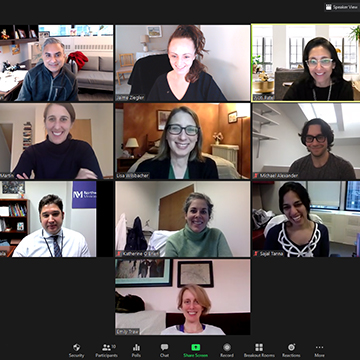New Program Designed to Bridge Gap Between Clinician-Educators, Research
Clinician-educators, by definition, put clinical care first.
“Although these faculty spend a significant amount of time on clinical care, they are also expected to participate in research and educational endeavors at the medical school,” says Ravi Kalhan, MD, MS, Professor of Medicine in the Division of Pulmonary and Critical Care; and Preventive Medicine in the Division of Epidemiology. “As clinical demands have increased, and obtaining research funding has grown more competitive, there are a number of real and perceived barriers to physicians making research a significant part of their careers.”
To better help overcome those obstacles, the Northwestern University Clinical and Translational Sciences (NUCATS) Institute’s Center for Education and Career Development (CECD) is piloting a new program that brings clinician-educators together in a virtual space to enhance their knowledge of the research enterprise.
“We realize that if we do not enable physician faculty to participate in research, our ability to make long-term impacts on clinical disease will suffer,” says Kalhan, CECD co-director. “Physicians are trained to ask questions, but when a clinician wants to ask or answer a scientific inquiry, they often lack the training, resources, and collaborations to do so.”
The Northwestern University Clinical and Translational Investigation Accelerator is co-led by Kalhan and Jyoti Patel, MD, Professor of Medicine in the Division of Hematology and Oncology. The first cohort began in January with six faculty members from the Department of Medicine. The group meets monthly in a virtual setting to deliver presentations on topics related to clinical research and study design — areas of focus include biostatistics, the Northwestern Medicine Electronic Data Warhouse, and clinical trial design. Participants then provide peer-feedback in a discussion moderated by Kalhan and Patel.
“Learning from each other has been such a valuable part of the program, and has helped me to further develop and refine my study, making it more rigorous in the process,” says Karlyn Martin, MD, Assistant Professor of Medicine in the Division of Hematology and Oncology. “As importantly, the CTIA has connected me to the Northwestern research community, in a way that I think many other clinician-educators would benefit from.”

We think if we provide programming to fill the knowledge gaps that often exist, we will generate more enthusiasm on the part of our faculty to make research and discovery part of their regular activities.”
Ravi Kalhan, MD, MS, Center for Education and Career Development CECD co-director (top left)
With a goal of helping clinician-educators get their research studies off the ground, the CTIA is designed for individuals who already have a research project and mentor identified.
“We think if we provide programming to fill the knowledge gaps that often exist, we will generate more enthusiasm on the part of our faculty to make research and discovery part of their regular activities,” says Kalhan.
As CECD co-director and director of Northwestern's Masters’ of Science in Clinical Investigation program, one of Kalhan’s goals is to encourage more physicians to participate in research. Kalhan's own research focus is on respiratory epidemiology. He leads large-scale epidemiologic cohort studies focused on lifecourse transitions from respiratory health to chronic lung disease while his clinical practice is centered around providing comprehensive care to patients living with asthma and chronic obstructive pulmonary disease across all stages of severity.
“Part of why I love my job is that it combines being a doctor — taking care of patients — with generating new knowledge,” says Kalhan, who is himself a physician-investigator on the clinician-educator track. “I would not trade that combination for anything, and think that working on teams that conduct clinical and translational research can be really gratifying. I think we need to model that better for our trainees and junior faculty and provide programming to better engage them in research.”
To express interest in the Northwestern University Clinical and Translational Investigation Accelerator program, please email Kalhan, Patel or nucats-ed@northwestern.edu.
Written by Roger Anderson




